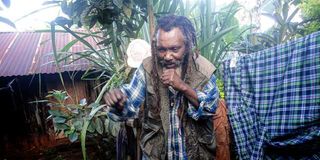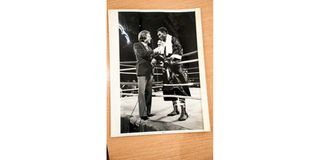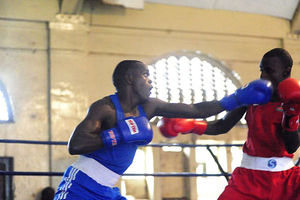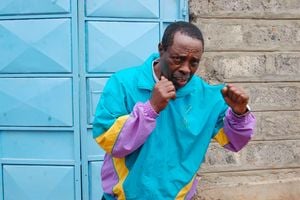
Boxer Peter Kamau ’Pipino’ Wanyoike strikes a pose at his home in Komothai, Kiambu County, on December 22, last year. The retired boxer won eight gold medals for Kenya in international tournaments.
Peter Kamau “Pipino” Wanyoike ranks as high up as Philip Waruinge, Stephen Muchoki, Robert Wangila, and Ibrahim “ Surf” Bilali in Kenyan boxing, yet he lives in obscurity despite having accomplished so much for the country.
Wanyoike, one of Kenya's most accomplished boxers, lives in obscurity at his Komothai home in Kiambu County. We have talked regularly on phone but I had not seen the retired boxer for close to 20 years since our last meeting in his heyday.
As I waited at the entrance to Komothai Girls High School as per our agreement, my mind raced back to an image of him from 20 years ago as a slender but energetic man.
He had a unique smile which one of my primary school teachers back in the 1960s said could melt ice in the North Pole.
After a short time of waiting, I heard someone call my name with excitement; “Hi Waigwa! Welcome to Komothai.”
Except for his legendary smile, Kamau was a completely changed man, bigger and with dreadlocks that made him look like Mau Mau hero Field Marshal Dedan Kimathi, or other former freedom fighters.
Since retiring in 2009 as a Senior Sergeant after 34 years at Kenya Prisons Service, he let his hair grow unrestricted into dreadlocks.
Born in Kiganjo, Nyeri in 1957, Wanyoike was nicknamed “Pipino” after Mexican boxer José Isidro “Pipino” Cuevas González who competed from 1971 to 1989, and held the World Boxing Association welterweight title from 1976 to 1980.
Cuevas was inducted into both the International Boxing Hall of Fame, and the World Boxing Hall of Fame. In a few minutes, we were in his house, surrounded by well maintained vegetation and a variety of crops.

Kenyan boxer Peter Kamau ‘Pipino’Wanyoike (right) is congratulated by NBC commentator in April 1980 after fighting American boxer Denis Armstrong in Washington.
As we take seats facing each other to revisit his illustrious career in boxing, I ask him what he thinks is the highlight of his career. He says during the time he represented Kenya globally, he won a total of eight gold medals which no other Kenyan boxer has ever achieved.
These include three gold medals from the prestigious King's Cup Boxing Championship held in 1980, 1981 and 1982 in Bangkok, Thailand. Kings Cup attracted top boxers from well established boxing countries such as the United States of America, Russia, Mexico, among others.
He won a gold medal for Kenya at the 1978 All Africa Games (now renamed African Games) in Algeria. In 1982, Wanyoike won gold medal in President Marcos Cup in Manila, Philippines.
He won two more gold medals in the East and Central Africa Boxing Championships in 1985 and 1986. There was also another gold medal during the Pacific Games in Wellington, New Zealand in 1984 involving boxing teams from various parts of the world.
Wanyoike had also claimed a bronze medal at King's Cup in 1983 in what he thought was an unlucky moment.
He is the only Kenya boxer to have beaten hard-hitting Ugandan boxer John “The Beast” Mugabi whom he beat twice. I had watched Mugabi fight in a boxing tournament between Kampala and Nairobi, and he destroyed his Kenyan opponent in less than a round. For Kamau to have beaten Mugabi twice in Uganda spoke volumes about his ability in the ring.
Mugabi later turned pro and contested the world middleweight title against Marvin ‘Marvellous’ Hagler of the United States and lost. I always imagine what would have happened had Wanyoike turned professional and got a chance to fight Hargler, one of the toughest boxers at the time. Both Wanyoike and Hargler were southpaw boxers, which would have made the fight interesting.
Wanyoike visited USA whenever Kenyan boxers were invited there to fight against Americans. He says he never lost to any American during the time he was there. He had made many friends in USA and would extend his stay when the Kenyan boxing team had ended its tour.
“During my extended stay in USA as part of their boxing team, we would tour several states to fight against other boxing teams. This was the best exposure for me as I beat every opponent selected to fight against me. Muhammad Ali made a number of appearances at some of the places where fights were held. He gave us a lot of encouragement as he displayed his legendary boxing skills, including ‘Ali Shuffle’, a technique that involved a boxer ‘shuffling’ the feet back and forth, but at a very swift speed, enough to make it impossible for the opponent to ignore.
Wanyoike had endeared himself to American society as seen in some of the photographs he has in his house. In one of those photos, he is seen being interviewed by a NBC anchor for a television documentary after one of the many fights he won across USA.
A huge flamed certificate hanging on the wall in his house shows that Wanyoike is an Honorary Citizen of Metropolitan Nashville - Tennessee. Being recognised and accepted in USA made it easier for him to travel back to Kenya as the situation demanded.
This made Nashville home away from home for him in the three years he worked as a boxing trainer between 1984 and 1986. He had initially planned to turn pro but dropped the idea due to his advanced age. He was in his 30s, and professional fights were very demanding in terms of training and other logistics.
Boxing has changed over time, and Wanyoike says the new scoring system is better. Before, a boxer could be punished by another after sustaining an injury, and the referee would not interfere.
Today, a boxer suspected of being under serious punishment from an opponent can be saved faster once the referee notices a problem.
The removal of boxing from the list of sports to be contested at the 2028 Los Angeles Olympics has brought confusion and anxiety among the ‘Sweet Science’ or boxers who stay calm and strategic, aiming to win the fight without taking too much damage.
Kamau says it is impossible to imagine the Olympic Games without boxing as it is the only arena where boxers can assess themselves to the maximum.
Wanyoike prefers full round boxing to entertain fans as opposed to technical knock-out (TKO) which he says is not enough to assess a boxer’s ability.
A trend where well trained and accomplished martial artists come out to challenge highly trained boxers has divided opinion.
Those who support the trend argue that the only way to know who is the best is to allow them to fight. Those who oppose argue that allowing them to fight diminishes the aura of boxing which is seen to be more superior than martial arts.
Martial arts specialists like Conor McGregor has challenged boxer Floyd Mayweather, the undefeated featherweight king with 50 wins, while heavyweight martial artist Francis Ngannou has also challenged former world heavyweight boxing champion Anthony Joshua, which are clear indications that fans want the air cleared as to who is the best.
Mayweather and Joshua won in their respective fights and cleared the air. Wanyoike feels one should be free as a martial artist to challenge a boxer as long as boxing rules are followed.









